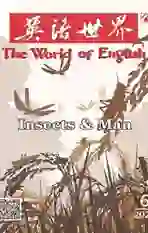《浮生六记》英译阅读与讨论 (三)
2020-08-07刘士聪
刘士聪


【背景】余笑曰:“初不料陈淑珍乃李青莲知已。”芸笑曰:“妾尚有启蒙师白乐天先生,时感于怀,未尝稍释。”余曰:“何谓也?”芸曰:“彼非作《琵琶行》者耶?”
【原文】余笑曰:“异哉!李太白是知己,白乐天是启蒙师,余适字三白,为卿婿,卿与‘白字何其有缘耶?”芸笑曰:“白字有缘,将来恐白字连篇耳(吴音呼别字为白字)。”相与大笑。(第21页)
【译文】“How very strange!” I laughed. “Li Po is your bosom friend; Po Chu-yi, your first teacher, and I, with the literary name San-po (Three Pos), am your husband. Your destiny seems linked to the character of ‘po.”
“If ‘po characters are my fate,” Yuen smiled, “Im afraid there will always be ‘po characters in my poems.” (In Soochow we call incorrectly written characters “po” characters.) Finding this very funny, we both burst out laughing. (p. 14)
【简评】陈芸死后,沈复曾说,“及余家居,惟以文字相辨析而已”。夫妻二人在家时常一起谈论诗文,这段文字写了他们夫妻生活的一个侧面,风趣、幽默。
译者依据原文亦步亦趋地译,巧妙处理了文中的“白”字,译出了原文的诙谐。
然后是“有缘”,一个说your destiny,一个说my fate,一起一应,衔接自然。译者的翻译技巧值得我们揣摩。
【原文】余性爽直,落拓不羁;芸若腐儒,迂拘多礼。偶为之整袖,必连声道“得罪”;或递巾授扇,必起身来接。(第22页)
【译文】I am naturally straightforward and easy-going, unhampered by conven-tion; but Yuen, like a pedantic old Confucian scholar, firmly believed in propriety and ceremony, and insisted on observing many old-fashioned formalities in our daily life. Whenever I helped her into a robe or adjusted a sleeve for her she would murmur repeatedly, “Im so sorry to trouble you. Im so sorry to trouble you.” If I brought her a handkerchief or a fan she would insist on rising to receive it from me. (pp. 14-15)
【簡评】“余性爽直,落拓不羁”,译文“I am naturally straightforward and easy-going, unhampered by convention; ...”把原文所包含的意思几乎都说了。“爽直”,译作straightforward,表示人品性格时,意为honest and frank(The New Oxford Dictionary of English《新牛津英语词典》)。“落拓”,《现代汉语词典》解释为“豪迈,不拘束”,也即“落拓不羁”,译文用了easy-going和unhampered by convention。easy-going意为relaxed and tolerant in approach and manner,也是一种潇洒的表现。虽然句子形式不同,但原文意思表达得准确无误。
这正是译者在译文“序言”里声明所遵循的一个原则:I have also tried to be as meticulous as I could in expressing the exact meaning of the Chinese words.
“迂拘多礼”的译文从两个方面作解释:firmly believed in propriety and ceremony,相信行为举止和礼仪;insisted on observing many old-fashioned formalities in our daily life,遵守生活中的老规矩。
这种译法也涉及语言风格,即译文风格与原文风格有别。用今日英语翻译中国古代文言文,译文难以做到与原文叙述风格保持一致。文言文言简意赅,信息量大,与英语在句法结构上的差别很大;英译文一方面要扩充信息,在难寻形式的对应时,要以完整的英语句式重写原文,再考虑思维方式的因素,叙事风格难以趋同。重要的是在兼顾达意的同时,尽量在表达方式上体现一种简洁、统一的行文风格。
【背景】婚后,沈复遵父亲意志,离家赴杭州赵省斋先生门下学习。
【原文】居三月,如十年之隔。芸虽时有书来,必两问一答,半多勉励词,余皆浮套语,心殊怏怏。每当风生竹院,月上蕉窗,对景怀人,梦魂颠倒。(第19页)
【译文】The next three months, as I dragged my way through them, felt like ten years of unendurable separation. Letters from Yuen arrived regularly enough, although for two of mine I received only one in reply; but of these, half were filled with words of caution or encouragement, the rest with mere frivolous conventionalities. Sadness and dejection filled my heart. Every time the wind rustled the bamboos in my courtyard or the moon silvered the leaves of the banana trees beside my window, I remembered other moons and other nights until my soul became entranced with an unreal world of dreams and fancies. (p. 11)
【简评】“居三月,如十年之隔”,这在中文里比较流行,说法各异,意思相同,不同译者也会给出不同译文。此处的“The next three months, as I dragged my way through them, felt like ten years of unendurable separation”,体现了译者要尽量把中文确切意思译出来的宗旨,原文意思说得充分,因而有厚重感。
“风生竹院,月上蕉窗”,诗一般的语言。首先是“竹院”和“蕉窗”,怎么翻译,如何落笔,怎么用英语写得既合乎实际又富有诗意。译者将“竹院”写作the bamboos in my courtyard——院里的竹子,将“蕉窗”写作the banana trees beside my window——窗旁的蕉树,这样理解是合理的,用英语这样处理意思清楚,行文也自然。rustled和silvered两个动词用得好:前者让我们看见摇曳的竹枝,听见竹叶的窸窣作响;后者让我们看见蕉叶上的斑驳月光。此般情景,让只身在外的沈复越发感到孤独,越发思念家中的爱妻。译文成功描绘了院中的景色,也映衬了作者当时的心情。
